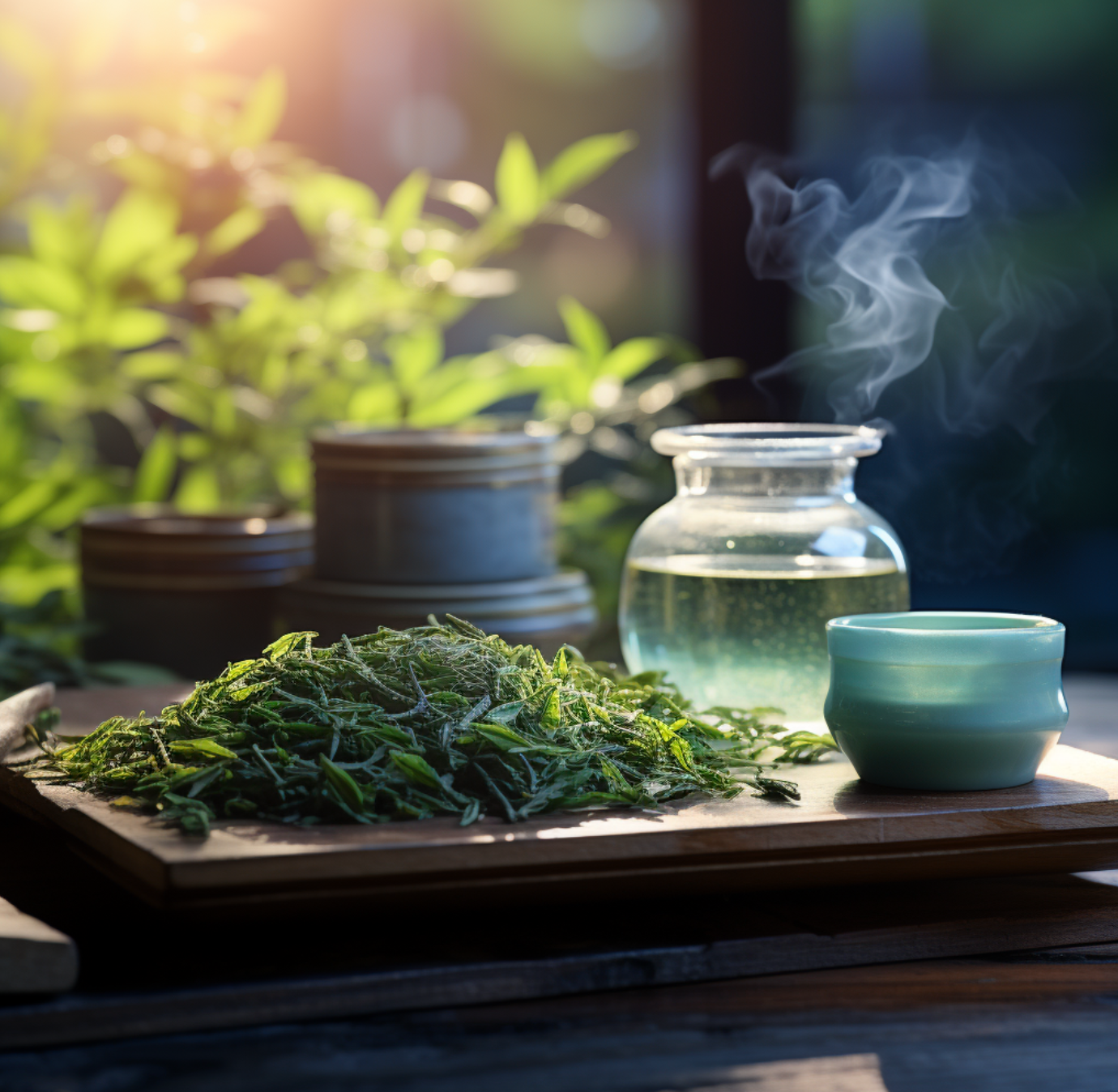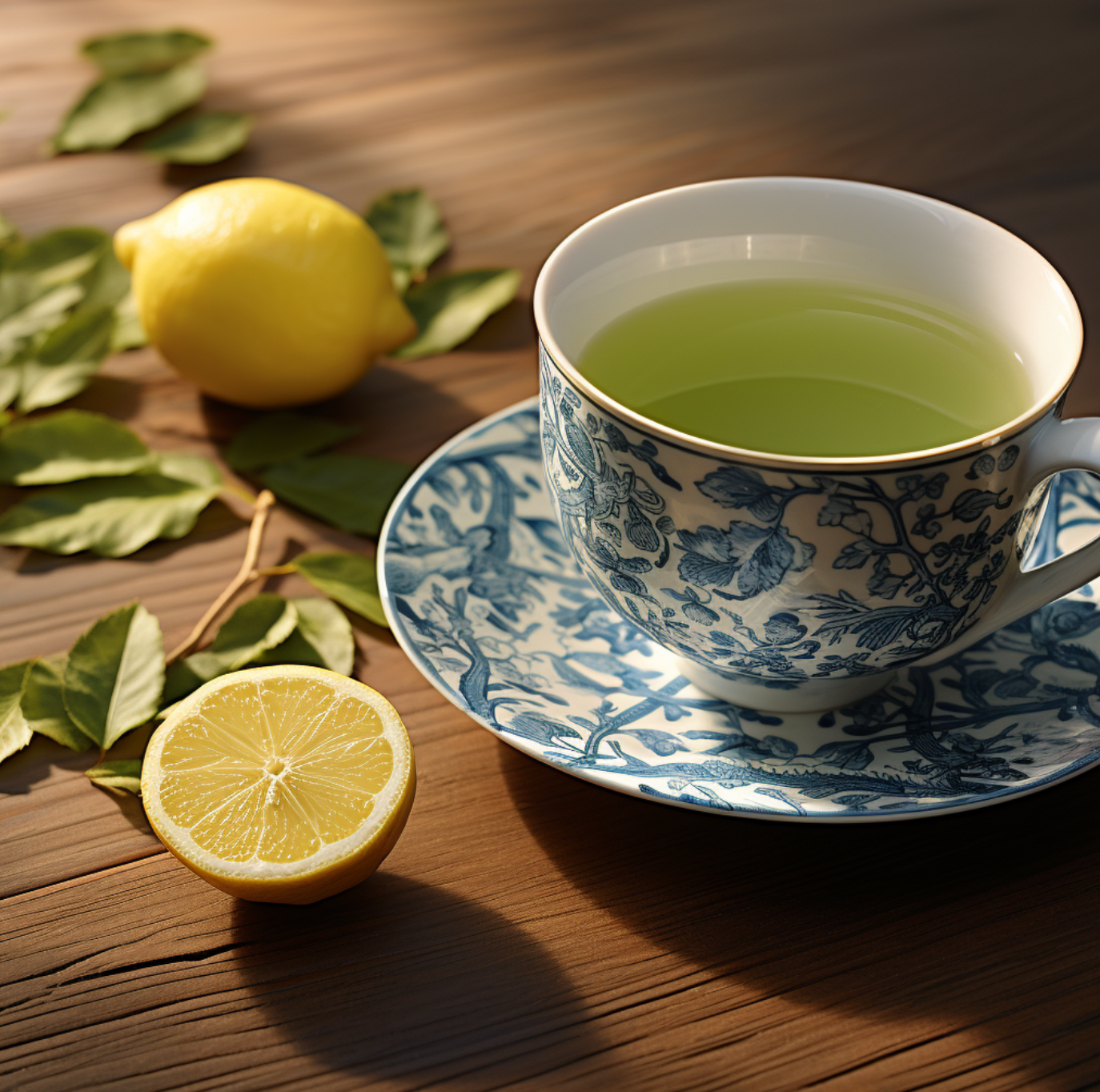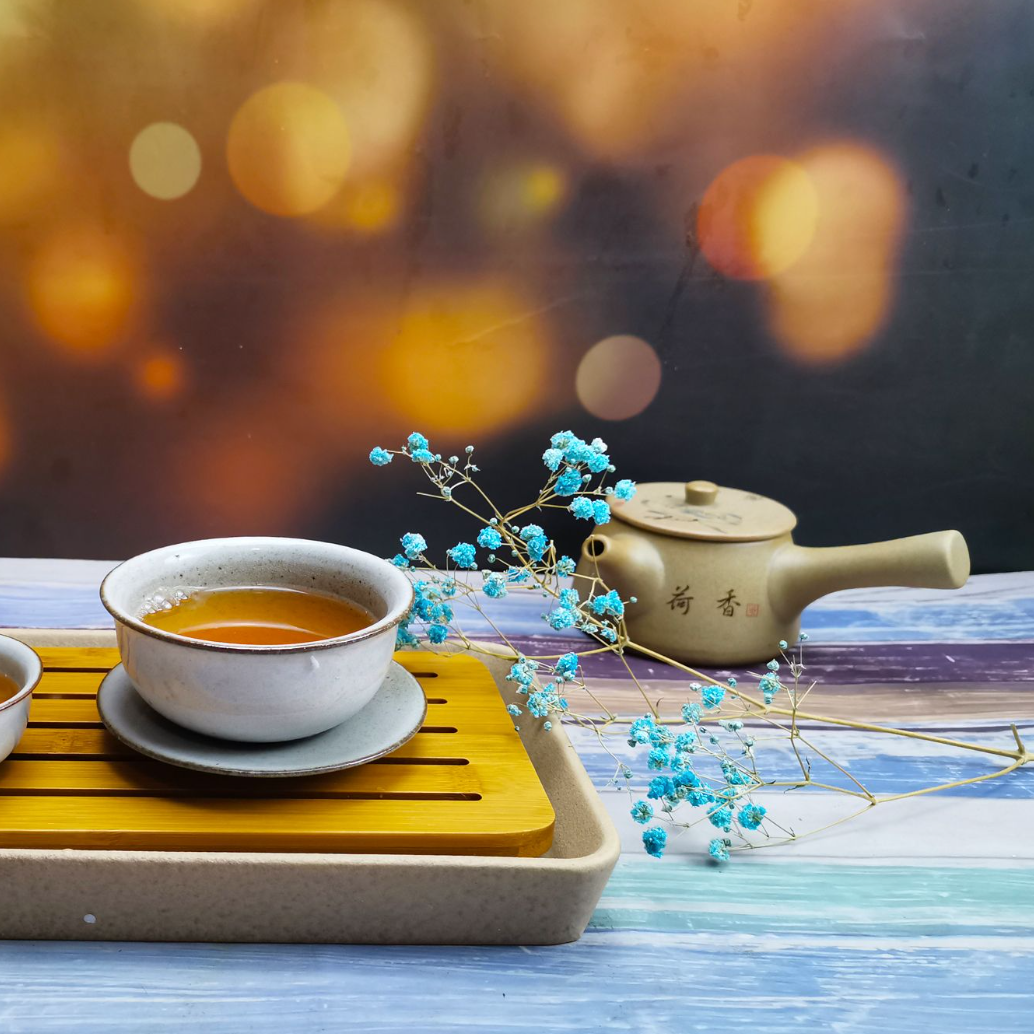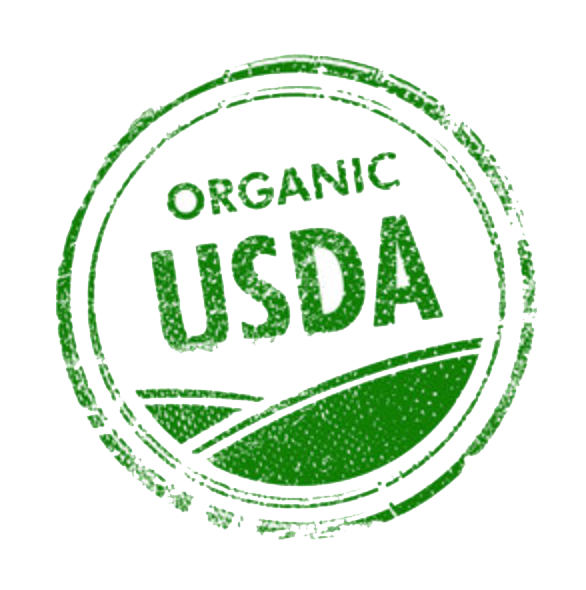
Will tea steep in cold water?
Among the six major tea categories, which teas are suitable for cold brewing?
I saw a blogger on the Internet recommending cold brew tea, saying that most of the six major tea categories can be cold brewed.
For green tea, choose Anjibai, Biluochun, Guapian, etc. with refreshing flavors. Stir-fried green tea with too strong aroma of roasted beans is not recommended.
For yellow tea, we recommend high-grade Huangya Tea and Junshan Silver Needle.
For white tea, white tea with delicate buds and leaves, such as Silver Needle and White Peony, is preferred. Old white tea that is too old is not suitable.
For oolong tea, Wuyi rock tea with higher roasting temperature is not recommended. You can try the fragrant Tieguanyin, Phoenix Dancong, Taiwan Alpine Oolong, etc.
Black tea, fresh, sweet and fragrant black tea, such as Lapsang Souchong, Keemun Red, etc., is better when cold brewed.
Dark tea, most of which are pressed into tea cakes and tea bricks, require hot water to stretch and are not suitable for cold brewing.
Scented tea (reprocessed tea), the biggest advantage of cold brewing scented tea is the fragrance.
This experience-based talk has received a lot of recognition.
But Chen, a village girl who is used to making tea in the traditional way, would like to remind everyone that before choosing cold brew tea, it is recommended to think twice before making the decision.
This is because, among the six major tea categories, most of the good teas with rich content cannot extract deep tea flavors if they are cold brewed.
For good tea, it is undoubtedly a waste.
Can cold-brewed tea retain more nutrients in tea leaves?
Some people think that when making tea, water temperature that is too high will destroy the nutrients of the tea leaves.
Cold brewing tea can delay the leaching time of tea flavor, inhibit the release of bitter substances, and effectively extract tea nutrients.
I have to say, these words are very confusing.
Good tea is not afraid of boiling water at all, so how can it destroy nutrients?
When boiling water to make tea, the boiling water temperature is very high, which can effectively stimulate the aroma and flavor of the tea.
Brewing tea with boiling water can effectively stimulate the aroma of tea with a high boiling point.
Smell it while it's hot, and you'll smell a particularly rich, high-pitched, and wonderful aroma.
Then, as the temperature of the soup drops naturally, the aroma of tea with medium and low boiling points gradually appears.
Take making tea in a tureen as an example.
After pouring in boiling water and pouring out the tea soup, the aroma of the tea is very different when you uncover it while it's still hot and smell it after a while.
Cold-brewed tea can only release a small amount of low-boiling-point aroma, and those high-flavored and fragrant tea aromas have no chance to appear.
The same goes for the leaching of tea flavor.
Good tea with rich inner qualities cannot be brewed without boiling water.
Brewing tea with boiling water can create a mellow, syrupy, and rich tea flavor.
However, the tea flavor of cold brewed tea is limited, and in terms of the thickness of the tea soup, it is definitely not as good as hot brewed tea!
Is it easier to brew tea with cold water than with hot water?
The traditional way of making tea cannot be separated from hot water.
If you want to drink tea, in addition to preparing tea leaves, you also need hot water.
Many times, when you are away from home and cannot provide hot water, you cannot drink tea at all.
But cold brew tea is different. It completely subverts the tradition. As long as there is water, you can make tea.
The simplest way to make cold brew tea is to put the tea leaves directly into a mineral water bottle and let it sit for a few hours before drinking.
It is very convenient whether traveling outdoors or driving.
However, from the perspective of saving time, the tea flavor extraction efficiency of cold brew tea is slow, which may not save much time and effort.
Rather than waiting patiently for hours, wait for the flavors of your cold brew tea to soak in.
Choose hot water to make tea, and you can drink heart-warming hot tea in just three strokes and five divisions.
Good tea with rich inner content can be brewed with boiling water for just a few seconds, and the taste of the brewed tea will not be bland.
But most of the time, if you brew tea with cold water at room temperature and only brew it for more than an hour, the taste will not be enough.
There are even many claims on the Internet that cold brew tea should be refrigerated for 4-6 hours...
This requires preparing the refrigerator and providing refrigeration conditions.
I have to wait patiently for several hours before I can drink tea to quench my thirst and soothe my throat.
To be fair, this may not be that easy!
Would cold brew tea taste better with some fruit or syrup?
In recent years, the new tea drinking trend that has emerged in the tea circle goes far beyond cold brew tea.
There are also a variety of flavored teas and fruit teas, such as peach oolong, snow pear white tea, green orange black tea, etc.
Of course, there are also many "fashionable" people who combine flavored tea with cold brew tea.
I think adding some fruit, syrup, and honey to cold brew tea will give it a better final flavor.
There is a saying, following this operation, it is better to say that it is drinking tea than drinking beverages.
Because after adding a lot of "foreign substances" to a cup of tea, you really can't taste the characteristics of the tea itself.
Even if it is a kind of tea, the tea taste is mediocre, too light to be brewed, and even contains miscellaneous and strange smells.
But after adding fruits and syrup, it instantly becomes fruity, sweet and moving.
With a little processing and extra ingredients, all the original shortcomings can be covered up.
The truth is somewhat similar to Mr. Dongguo's performance.
When one person is playing solo, it is obvious at a glance that his level is insufficient; but when everyone is playing together, he can have the opportunity to make up for his mistakes.
The same goes for making tea.
It is a good tea with rich inner content and wonderful tea flavor. No additional ingredients are needed. The simple original taste is enough.
And those flavored cold brew teas that add a lot of fruits, honey, and syrup are simply a breeding ground for all kinds of inferior tea!
The popularity of cold brew tea is in line with the "novelty", "novelty" and "early taste" mentality of some groups in drinking tea.
But in the long run, this subversive way of tea drinking by Internet celebrities may not last long.
For tea drinkers who truly love tea, understand tea, and are willing to appreciate the original taste of good tea, they will not be willing to waste their own good tea.
When it comes to drinking tea, it is better to brew it with hot water, drink it freshly, or drink it while it is hot, so that you can better appreciate the beauty of good tea.
Cold-brewed tea that has been refrigerated usually only feels cold when it is put into the throat due to the physical temperature difference.
Hot tea is different, traditional hot tea with rich content.
Don't be impatient when drinking tea.
When the temperature of the scalding hot tea drops slightly and it no longer "burns your mouth" when you drink it, drink it while it's still hot.
Hot tea at a moderate temperature makes drinking tea more palatable.
In addition, after drinking hot tea, it can also leave a comfortable aftertaste in the throat.
The sweetness returns quickly, and the production of body fluids lasts for a long time. There is even a mint and cooling sensation in the throat.
It only goes to the throat, but it goes to the heart.
This lingering tea flavor is like a lingering sound, making it even more exciting!
I saw a blogger on the Internet recommending cold brew tea, saying that most of the six major tea categories can be cold brewed.
For green tea, choose Anjibai, Biluochun, Guapian, etc. with refreshing flavors. Stir-fried green tea with too strong aroma of roasted beans is not recommended.
For yellow tea, we recommend high-grade Huangya Tea and Junshan Silver Needle.
For white tea, white tea with delicate buds and leaves, such as Silver Needle and White Peony, is preferred. Old white tea that is too old is not suitable.
For oolong tea, Wuyi rock tea with higher roasting temperature is not recommended. You can try the fragrant Tieguanyin, Phoenix Dancong, Taiwan Alpine Oolong, etc.
Black tea, fresh, sweet and fragrant black tea, such as Lapsang Souchong, Keemun Red, etc., is better when cold brewed.
Dark tea, most of which are pressed into tea cakes and tea bricks, require hot water to stretch and are not suitable for cold brewing.
Scented tea (reprocessed tea), the biggest advantage of cold brewing scented tea is the fragrance.
This experience-based talk has received a lot of recognition.
But Chen, a village girl who is used to making tea in the traditional way, would like to remind everyone that before choosing cold brew tea, it is recommended to think twice before making the decision.
This is because, among the six major tea categories, most of the good teas with rich content cannot extract deep tea flavors if they are cold brewed.
For good tea, it is undoubtedly a waste.
Can cold-brewed tea retain more nutrients in tea leaves?
Some people think that when making tea, water temperature that is too high will destroy the nutrients of the tea leaves.
Cold brewing tea can delay the leaching time of tea flavor, inhibit the release of bitter substances, and effectively extract tea nutrients.
I have to say, these words are very confusing.
Good tea is not afraid of boiling water at all, so how can it destroy nutrients?
When boiling water to make tea, the boiling water temperature is very high, which can effectively stimulate the aroma and flavor of the tea.
Brewing tea with boiling water can effectively stimulate the aroma of tea with a high boiling point.
Smell it while it's hot, and you'll smell a particularly rich, high-pitched, and wonderful aroma.
Then, as the temperature of the soup drops naturally, the aroma of tea with medium and low boiling points gradually appears.
Take making tea in a tureen as an example.
After pouring in boiling water and pouring out the tea soup, the aroma of the tea is very different when you uncover it while it's still hot and smell it after a while.
Cold-brewed tea can only release a small amount of low-boiling-point aroma, and those high-flavored and fragrant tea aromas have no chance to appear.
The same goes for the leaching of tea flavor.
Good tea with rich inner qualities cannot be brewed without boiling water.
Brewing tea with boiling water can create a mellow, syrupy, and rich tea flavor.
However, the tea flavor of cold brewed tea is limited, and in terms of the thickness of the tea soup, it is definitely not as good as hot brewed tea!
Is it easier to brew tea with cold water than with hot water?
The traditional way of making tea cannot be separated from hot water.
If you want to drink tea, in addition to preparing tea leaves, you also need hot water.
Many times, when you are away from home and cannot provide hot water, you cannot drink tea at all.
But cold brew tea is different. It completely subverts the tradition. As long as there is water, you can make tea.
The simplest way to make cold brew tea is to put the tea leaves directly into a mineral water bottle and let it sit for a few hours before drinking.
It is very convenient whether traveling outdoors or driving.
However, from the perspective of saving time, the tea flavor extraction efficiency of cold brew tea is slow, which may not save much time and effort.
Rather than waiting patiently for hours, wait for the flavors of your cold brew tea to soak in.
Choose hot water to make tea, and you can drink heart-warming hot tea in just three strokes and five divisions.
Good tea with rich inner content can be brewed with boiling water for just a few seconds, and the taste of the brewed tea will not be bland.
But most of the time, if you brew tea with cold water at room temperature and only brew it for more than an hour, the taste will not be enough.
There are even many claims on the Internet that cold brew tea should be refrigerated for 4-6 hours...
This requires preparing the refrigerator and providing refrigeration conditions.
I have to wait patiently for several hours before I can drink tea to quench my thirst and soothe my throat.
To be fair, this may not be that easy!
Would cold brew tea taste better with some fruit or syrup?
In recent years, the new tea drinking trend that has emerged in the tea circle goes far beyond cold brew tea.
There are also a variety of flavored teas and fruit teas, such as peach oolong, snow pear white tea, green orange black tea, etc.
Of course, there are also many "fashionable" people who combine flavored tea with cold brew tea.
I think adding some fruit, syrup, and honey to cold brew tea will give it a better final flavor.
There is a saying, following this operation, it is better to say that it is drinking tea than drinking beverages.
Because after adding a lot of "foreign substances" to a cup of tea, you really can't taste the characteristics of the tea itself.
Even if it is a kind of tea, the tea taste is mediocre, too light to be brewed, and even contains miscellaneous and strange smells.
But after adding fruits and syrup, it instantly becomes fruity, sweet and moving.
With a little processing and extra ingredients, all the original shortcomings can be covered up.
The truth is somewhat similar to Mr. Dongguo's performance.
When one person is playing solo, it is obvious at a glance that his level is insufficient; but when everyone is playing together, he can have the opportunity to make up for his mistakes.
The same goes for making tea.
It is a good tea with rich inner content and wonderful tea flavor. No additional ingredients are needed. The simple original taste is enough.
And those flavored cold brew teas that add a lot of fruits, honey, and syrup are simply a breeding ground for all kinds of inferior tea!
The popularity of cold brew tea is in line with the "novelty", "novelty" and "early taste" mentality of some groups in drinking tea.
But in the long run, this subversive way of tea drinking by Internet celebrities may not last long.
For tea drinkers who truly love tea, understand tea, and are willing to appreciate the original taste of good tea, they will not be willing to waste their own good tea.
When it comes to drinking tea, it is better to brew it with hot water, drink it freshly, or drink it while it is hot, so that you can better appreciate the beauty of good tea.
Cold-brewed tea that has been refrigerated usually only feels cold when it is put into the throat due to the physical temperature difference.
Hot tea is different, traditional hot tea with rich content.
Don't be impatient when drinking tea.
When the temperature of the scalding hot tea drops slightly and it no longer "burns your mouth" when you drink it, drink it while it's still hot.
Hot tea at a moderate temperature makes drinking tea more palatable.
In addition, after drinking hot tea, it can also leave a comfortable aftertaste in the throat.
The sweetness returns quickly, and the production of body fluids lasts for a long time. There is even a mint and cooling sensation in the throat.
It only goes to the throat, but it goes to the heart.
This lingering tea flavor is like a lingering sound, making it even more exciting!






